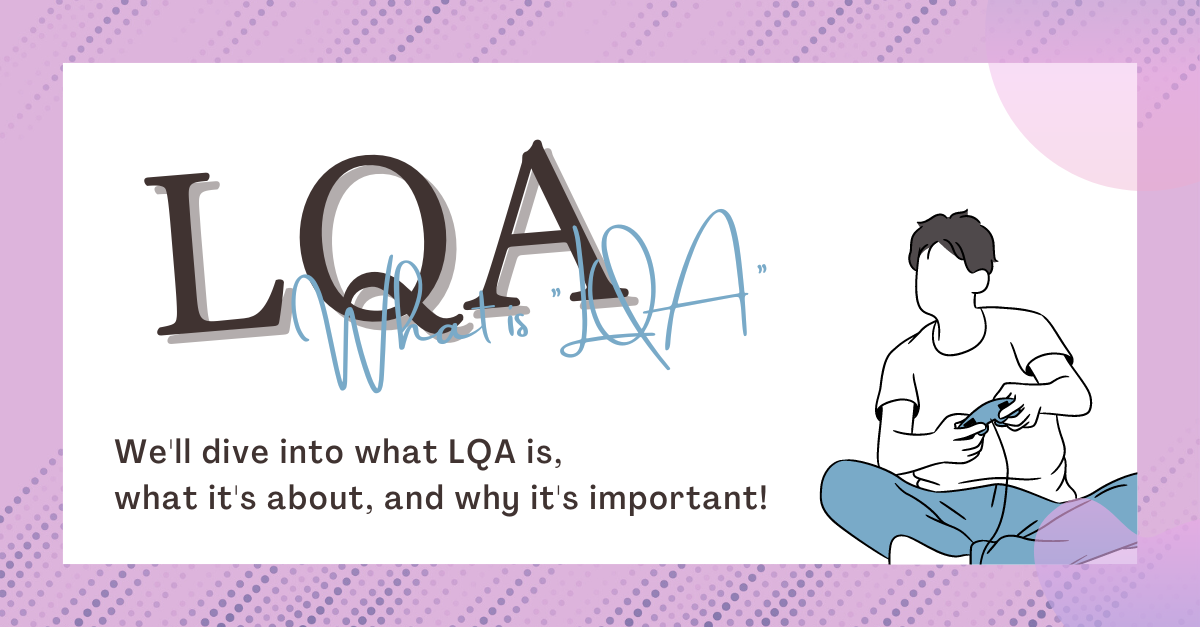In this article, we’ll dive into what LQA is, what it’s about, and why it’s important!
Contents
- What is LQA?
- LQA greatly contributes to a game’s global success
- Cultural differences between Japan and the rest of the world
- Active Gaming Media takes into account religious and cultural factors when performing LQA
- Games that skip LQA tend to receive negative feedback
- LQA improves the quality of a game’s translation
- Contact us about our LQA services, or anything else!
What is LQA?
LQA is short for “Linguistic Quality Assurance.”
As the name implies, this is crucial for quality control and improving the quality of games being developed in multiple languages. Japanese game translators have generated buzz on Twitter in recent times by bringing up the importance of LQA.
“When putting the finishing touches on a localization, there are likely errors and points of improvement that can only be found through LQA. By not doing this yourself, you ultimately don’t have control over the quality of the end product. This is likely the reason why translators are hesitant about putting their name out there as the one responsible for the translation of a game without performing the LQA themselves.”
Quoted from an article on our gaming news site “AUTOMATON.”
Translators in Japan discuss the importance of LQA in video games.
LQA greatly contributes to a game’s global success
That quote above just goes to show that the LQA process is considered important for assuring localization quality. Ultimately, it’s the players that judge the quality more so than the creators or translators. This is why LQA is done with a focus on finetuning games so there are no hiccups in gameplay. Game dialogue and narration that sounds natural creates a more enjoyable and immersive experience for players. Native speakers check for how game scenes play out, character facial expressions, and other such context that can’t be seen in text-based localization.
Cultural differences between Japan and the rest of the world
There are more opportunities to play overseas games in Japan these days, and many are quite popular. Certain aspects of a game such as its GUI can cause issues here. For example, the “O” button is for confirming and the “X” button is for cancelling in Japan, but it’s the other way around elsewhere. In addition to these button mapping issues, certain gestures take on different meanings depending on the culture. Character gestures aren’t as straightforward as one might think. Most people assume that a character shaking their head from side to side is an action implying a negative response, but in some regions, such as India and Pakistan, it’s an affirmative one, the exact opposite.
Active Gaming Media takes into account religious and cultural factors when performing LQA
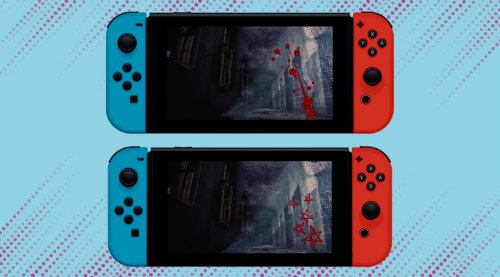
For countries with strict age ratings due to religious or cultural reasons, we check and report instances of bloodshed. In Japan, the depiction of parents bathing together with children is common but could be seen as bizarre in other countries. Since we use native speakers of the target language, we can report and make suggestions on oddities found in gameplay through the lens of culture, religion, and history.
Our LQA service aims to break down language barriers and help players all over the world fall in love with games. As such, many of our LQA staff are experienced testers, all of whom are native speakers of the target language. Furthermore, our hiring criteria takes into account whether or not the applicant likes games and whether or not they play games on a regular basis. In doing so, unlike Japanese testers with high linguistic abilities, we can provide historical, religious, and cultural considerations for the target language from a more realistic player perspective.
Games that skip LQA tend to receive negative feedback
The following are examples of what could easily slip by in a text-based translation and why LQA matters.
LQA case 1: Text overflowing from the text box
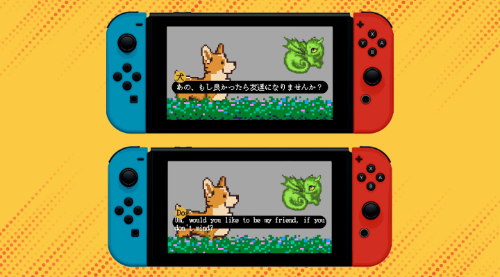
As one can imagine, sentence length will differ from language to language. However, sentence length is also impacted by how characters speak, regardless of the font or font size used remaining the same. For that reason, text will often protrude out of its box, rendering it difficult and sometimes impossible to read.
Having already gone over the familiarization process, we also check for context during an LQA. This includes watching out for things like character quirks and gauging if expressions are appropriate for the statements made or the situation. By doing this, we’re able to give players around the world a more natural gaming experience.
Context: character backgrounds, relationships, scenarios, world settings, etc.
Familiarization: reading provided supplementary material, actually playing the game, understanding the game’s setting and character quirks, additional research, etc.
LQA case 2: Font trouble
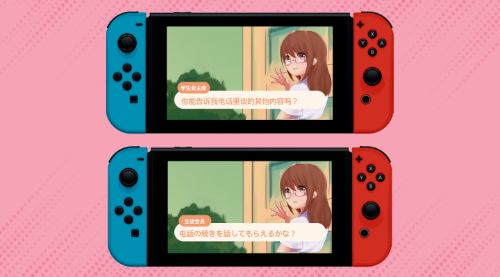
Some fonts don’t work for some languages. And even if a font appears suitable, there might be certain letters or characters that show up differently than expected. Worst case scenario is that the text gets garbled, effectively making it impossible to play the game. One commonly seen example of this would be a Simplified Chinese font being used to display Japanese characters. Since some characters can look very similar, the text might be mostly readable, but the players will notice and they’ll be sure to voice their opinions in reviews. You’ll see cases like this when the translation is done by companies with prices too good to be true, most of which aren’t localization companies in Japan.
LQA case 3: wrong in-game currency values
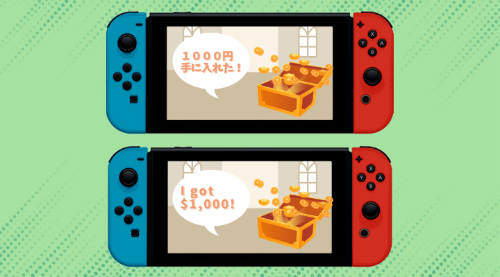
This image shows a huge error made resulting from the use of machine translation. For reference, the exchange rate as of August 2022 showed 1,000 yen to be worth $7.33 USD, and $1,000 USD to be worth 136,455 yen. Even when inflation impacts in-game purchasing, an item that should be around 1,000 yen being priced at 130,000 yen would be cause for alarm. Checking for accurate currency conversion is critical. We also check the prices of items to make sure they line up with the market prices in each region for games that emphasize realistic, current-day world settings. Additionally, LQA helps check for any bugs not yet found.
LQA case 4: Measurement mismatches
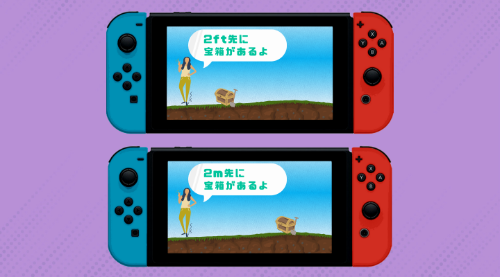
Only a few countries like the United States, Liberia, and Myanmar don’t use the metric system. Many in the US use imperial units and don’t measure things in meters. And so, as you can imagine, another unit of measurement being used for the same value will also change the length of the text. Even when the values are correct, they should be checked through LQA, as there might be some parts that don’t get implemented correctly.
In the UK, imperial units are sometimes used for the domestic market, with the metric system used for the international market. Furthermore, imperial units in the UK aren’t exactly the same as the imperial units in the US.
LQA improves the quality of a game’s translation
Since translation is typically done in a text-based environment, it can be hard to notice certain minor errors. Though we always double-check our work, on rare occasion certain parts of a check can get omitted or some factor might interfere with implementation. Also, there’s the concern that if LQA is done by non-native speakers of the target language, no matter how high their linguistic ability may be, they might miss things such as unnatural expressions. LQA is even more necessary for games that feature a focus on character dialects or specific speech or narration patterns. In the end, LQA benefits the players the most. It’s the secret ingredient that goes into the making of games that are loved around the world, in turn increasing fan bases. Although budgetary constraints or other such concerns can make this sound like skippable step, know that a game’s sales will most likely depend on its quality post LQA. For all these reasons, we always recommend including LQA when translating into multiple languages.
We’ve seen an increase in requests for re-translations due to dissatisfaction with the quality of work done by other companies. The same goes for the LQA of games that have been translated by other companies.
Contact us about our LQA services, or anything else!
Please feel free to contact us with any questions about LQA or any other aspect of localization. Perhaps you’re thinking that you don’t have a big enough budget for an LQA, but you still need the service. Active Gaming Media has helped plenty of individual developers and small, indie studios with game localization and LQA. If this is something you have concerns about, we’re here to help. Additionally, we offer free estimates, so please feel free to reach out!
Work with us ↓

